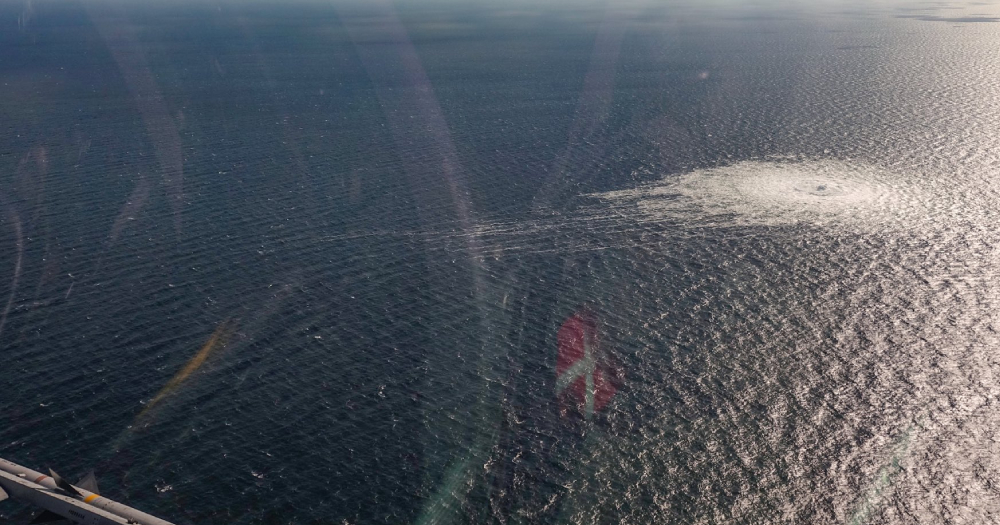Follow us on Telegram for the latest updates: https://t.me/mothershipsg
Four gas leaks emanating from the Nord Stream 1 and 2 pipelines have been detected on Sep. 26 and 27, likely caused by intentional explosions according to seismologists.
This has led to the West and Russia accusing each other of intentional sabotage. accusations of intentional sabotage by European states, the United States, and Russia.
Experts rule out natural causes
On Sep. 26, a Danish Air Force F-16 fighter jet on patrol spotted an area of the sea bubbling and frothing, and took the initial photograph of the leak.
Billeder fra F-16 af gaslækage i Østersøen. https://t.co/OgCDfcvTjG pic.twitter.com/D5wsoXvuda
— Forsvaret (@forsvaretdk) September 27, 2022
As of the time of writing, there are four confirmed leaks in the Baltic sea, coming from both Nord Stream 1 and the recently completed but also defunct Nord Stream 2. Three of the leaks are in the exclusive economic zones of Denmark and Sweden, near the Danish island of Bornholm.
Semiologists have ruled out natural causes such as undersea landslides, with Reuters quoting them as saying "there is no doubt these were explosions". Energy experts cited by the BBC agreed the cause was probably sabotage, and that the likelihood of four different leaks to occur at the same time is very low, although not impossible.
The Nord Stream pipelines were built to supply Germany, and through them, the European Union with natural gas from Russia. But since the start of the Russian invasion of Ukraine in Feb 2022, Germany and the EU have been trying to reduce their reliance on Russian energy sources, going so far as to cancel the Nord Stream 2 project.
Russian energy company Gazprom, in early September, had shut down the Nord Stream 1 pipeline "indefinitely", according to the Guardian. This follows a July shutdown of the pipeline.
Russia points the finger at U.S. for sabotaging the pipelines
Russian President Vladimir Putin said the leaks were "unprecedented sabotage", and claimed they were caused by "an act of international terrorism", while Russia's intelligence chief Sergey Naryshkin accused the U.S. of covering up for those who were responsible.
Russia has further accused the U.S. of blowing up the pipelines, stating that they had motive to sabotage the pipeline in order to sell more natural gas to the EU and increase its own sales. However, no evidence was offered to back their claim.
The White House has dismissed Russia's claims.
Given that Nord Stream 1 was no longer providing gas to Europe, and Germany had halted the Nord Stream 2 project after Russia invaded Ukraine, this accusation also seems odd as the U.S. would not have needed to sabotage the pipeline.
U.S. refrains from accusing Russia directly
As for the U.S., they have largely refrained from pointing the finger directly at Russia, with U.S. Secretary of Defense Lloyd Austin saying that it was too soon to blame anyone, and U.S. President Joe Biden declining to say whether he thinks Russia is responsible for the gas leak.
Other EU leaders said they believed sabotage was to blame but have not outright accused any country, although they have previously accused Russia of using gas supplies as a weapon against them in retaliation of their support for Ukraine.
Head of the International Energy Agency Fatih Birol was quoted by Reuters saying cryptically that "it is not yet known who made it, who is behind the sabotage", but that it was "very obvious... who was behind this issue".
Russia has dismissed suggestions that it was behind the leak, saying such accusations are "stupid and absurd".
Europe's energy woes
Germany in recent years has received as much as 55 per cent of its natural gas supply from Russia. Reducing its reliance on gas supply from Russia has led to increasing energy prices and worries that the upcoming winter will be cold and harsh as Europe struggles to find alternative energy sources to heat their homes and workplaces.
There are also concerns that the increasing energy price will drive manufacturing out of Europe.
Germany has responded to these worries by stockpiling natural gas. While reducing how much gas they buy from Russia, they are also filling their gas storage tanks, which were 91 per cent full as of Sep. 27.
According to Reuters, Germany is targeting 95 per cent by the end of November. This is predicted to be enough to last through the upcoming winter, but it will likely be the last winter they can reliably depend on the reserves to heat their homes.
Gas dispute not ending soon
The apparent sabotage of the Nord Stream pipelines means that two pipelines remain for the transport of Russian natural gas to Europe -- one running through Turkey and the other Ukraine.
But even that is at risk as Russian and Ukrainian gas companies are feuding over payment of transit fees for Russian gas moving through Ukrainian pipes, with Russian gas company Gazprom threatening to sanction its Ukrainian counterpart.
There is also further concern about the potential of escalation.
German Naval Chief Jan Christian Kaack, speaking before the leaks were detected, pointed out the abundance of economically vital infrastructure in the Baltic sea and the Atlantic ocean, such as a newly completed gas pipeline connecting Norway and Poland, as well as submarine data cables.
As the blame game plays out, the leaking pipes are spewing vast amounts of methane into the atmosphere, further complicating what is already a geopolitical and economic crisis.
Read more:
Top image via @forsvaretdk/Twitter
If you like what you read, follow us on Facebook, Instagram, Twitter and Telegram to get the latest updates.
